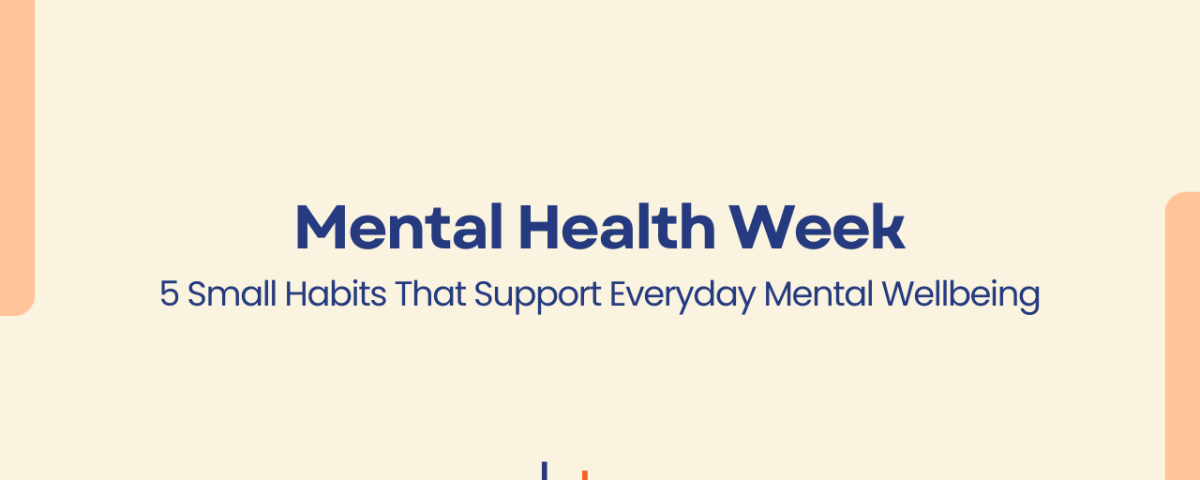5 Simple Habits to Support Everyday Mental Wellbeing
Mental Health Week reminds us that looking after our emotional wellbeing is not just for times of crisis — it’s an everyday practice. While therapy and professional support are important, research shows that small, consistent daily habits can make a significant difference in how we manage stress, regulate emotions, and stay connected to ourselves and others.
You don’t need to overhaul your life or make drastic changes. By adopting a few manageable routines, you can improve resilience, boost mood, and create lasting emotional balance. Here are five evidence-based habits you can start today to support your mental wellbeing every day.
1. Start the Day with Intention
Why it matters:
The way we begin our day sets the tone for mood, focus, and stress regulation. Positive psychology research shows that setting a daily intention or practising brief mindfulness can enhance emotional clarity and reduce anxiety.
How to try it:
Spend five minutes each morning pausing before your day begins. Sit quietly, take deep breaths, and ask yourself:
- “What do I want to bring to today?”
- Choose a word such as calm, focus, or patience.
- Or a gentle intention, like “I will treat myself with kindness” or “I’ll do one thing that nourishes me.”
This simple practice anchors your mindset, increases self-awareness, and helps prevent rushing through the day on autopilot.
2. Move Your Body in a Way That Feels Good
Why it matters:
Movement benefits mental health as much as physical fitness. Regular activity reduces symptoms of depression and anxiety, improves sleep, and increases stress resilience. Exercise also stimulates endorphins, which boost mood naturally.
How to try it:
You don’t need a gym or structured routine. Think of movement as joyful and sustainable:
- Take a daily walk
- Stretch for 10 minutes
- Dance around the house
- Try an online yoga or Pilates class
Consistency is more important than intensity. Even short bursts of activity can positively affect energy levels and emotional state.
3. Practice One Moment of Connection Each Day
Why it matters:
Human connection is essential for mental health. Daily interactions with friends, family, colleagues, or even strangers boost oxytocin (the “bonding hormone”), reduce loneliness, and increase emotional resilience.
How to try it:
- Send a “thinking of you” message
- Make eye contact and smile at someone
- Ask a loved one how their day really went
- Schedule a short call or catch-up
- Chat briefly with a neighbour or barista
Small, intentional acts of connection create belonging and remind us we are not alone.
4. Create a Digital Boundary
Why it matters:
Excessive screen time, social media scrolling, and constant notifications can increase stress, comparison, and mental fatigue. Digital boundaries allow your mind to reset and improve focus and emotional wellbeing.
How to try it:
Implement one manageable digital boundary:
- No phone for the first 30 minutes after waking
- Turn off push notifications
- Avoid scrolling before bed
- Place your phone in another room during meals
- Use “Do Not Disturb” during work or focus periods
Even small adjustments can help create mental space and reduce overwhelm.
5. End the Day with a Gentle Check-In
Why it matters:
Many people end their day with self-criticism or distraction, which prevents emotional processing and restful sleep. A short reflective check-in encourages self-compassion and closure.
How to try it:
Before bed, spend a few minutes asking:
- “What went well today?”
- “What am I proud of?”
- “What can I let go of for now?”
You might jot down responses in a notebook or reflect mentally. Over time, this habit shifts internal dialogue from judgment to understanding, helping your nervous system relax.
Why Small Habits Make a Big Difference
Mental health thrives on daily rhythms, not sudden transformations. These habits support your brain’s needs for structure, safety, connection, and self-reflection. Unlike unrealistic self-help trends, small, manageable practices are sustainable and become part of your identity over time.
By incorporating even one of these habits into your day, you’re investing in resilience and emotional wellbeing — consistently and sustainably.
Your Mental Health Matters Every Day
Mental Health Week is a prompt to pause and reflect, but your mental wellbeing does not need a crisis to require care. Everyday choices — connecting with others, moving your body, pausing to reflect, and setting boundaries — build long-term emotional strength.
Every small act counts. Each breath, walk, or moment of reflection contributes to resilience, balance, and overall wellbeing.
Call to Action
If you’d like extra support to improve your mental wellbeing, speak to a trained psychologist. At CBT Professionals, we help individuals navigate stress, build resilience, and establish routines that support emotional health.
Contact us today to learn more or book an appointment:
- Helensvale: (07) 5551 0251
- Mount Gravatt: (07) 3102 1366
- Nerang: (07) 5668 3490
Learn more: CBT Professionals – Mental Health Services
Frequently Asked Questions (FAQs)
Can small habits really improve mental health?
Yes. Evidence shows that consistent, small daily practices enhance emotional regulation, reduce stress, and build resilience over time.
Do I need to make major life changes to feel better?
No. Minor, sustainable adjustments — like mindful pauses, short walks, or small acts of connection — have significant benefits for wellbeing.
How does human connection support mental health?
Regular interactions increase oxytocin, reduce loneliness, and strengthen emotional resilience, even with brief daily gestures.
Are digital boundaries important for mental wellbeing?
Yes. Limiting unnecessary screen time and notifications can reduce stress, improve focus, and support emotional balance.
How can I reflect on my day without feeling self-critical?
End-of-day check-ins focused on gratitude, accomplishments, and letting go of stress foster self-compassion and improve sleep quality.
THREE CONVENIENT LOCATIONS
MOUNT GRAVATT
Mt Gravatt Medical PrecinctSE 105, 1808 Logan Rd
Upper Mount Gravatt QLD 4122


